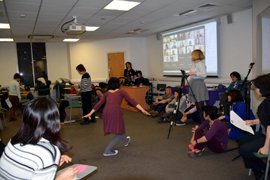The Work of the Japanese-Language Chief Advisor
The Japan Foundation, London
FUJIMITSU Yuko
The work of the Japanese-Language Chief Advisor (hereinafter “Advisor”) is wide ranging, but in this article I would like to focus on the work of providing support to the various events held in the UK and my work to find new training approaches.
The Work of the Advisor–(1) Attendance at Events on Japanese Language and Culture
In order to promote an interest in Japan and mutual exchange with a wide variety of people in the UK, the Japan Foundation, London (hereinafter “JF London”) makes sure to proactively leverage many different opportunities.
As the Advisor, I also have many opportunities to visit different places to carry out workshops and lectures, and those places are not limited to schools. I cover everyone from primary school pupils to researchers. Therefore, the scope of organizations, institutions, and events that I am involved with are very diverse. Just to give an example, the places and events I have visited in the past six months include a session to experience Japanese language at an event at a Scottish primary school (with support by the Consulate General of Japan in Edinburgh), a workshop for high school students held at the School of Oriental and African Studies (hereinafter “SOAS”) at the University of London (hosted by the Japan Society, SOAS, and the Ritsumeikan UK office), a workshop at the University of Stirling sponsored Japanese cultural event (hosted by the University of Stirling), a lecture for those interested in studying in Japan on exchange (hosted by the Japan office of the British Council and Keio University), and a Japanese class for researchers planning to visit Japan (hosted by the Japan Society for the Promotion of Science, London).
In this way, the Advisor responds to requests to attend and lecture at events on the Japanese language and culture by a variety of outside organizations in order to offer the people of the UK with opportunities to discover the fascination of the Japanese culture and language.
The Work of the Advisor–(2) Planning, Developing, and Implementing Teacher Training
The planning, development, and implementation of teacher training sessions to support their learning is another main task of the Advisor. JF London also emphasizes cooperation with local educational organizations and Japanese language educational institutions for our training program as well, and we hold a joint training session with the British Association for Teaching Japanese as a Foreign Language (hereinafter “BATJ”) twice per year. BATJ was founded by teachers of Japanese at the higher educational institutions in 1998. In addition to hosting an annual conference, seminars, and a Japanese speech contest for university students, they also manage research projects planned by members, publish newsletters and journals, and carry out many other active activities throughout the year.
For the joint Spring 2019 training session, planning for the event took place through online discussions with the directors of BATJ, and we have been collaborating to prepare for the event for a period of four months.

Spring 2019 training session, “Studies on Participation and Expression”
This training session, which took place at the University of London SOAS based on the theme of “Studies on Participation and Expression”, was divided into three sections, including reports by three members of BATJ, a practitioner research report by volunteer participants (from Italy, France, and Germany) on the 2017-2018 “Teacher Training for Japanese Teachers in Europe,” and a workshop by an instructor from the Japanese-German Center Berlin. I also proposed that the event be carried out as a hybrid event (involving both direct and online participation) using an online meeting system, a proposal which was adopted. Accordingly, the offline and online activities took place in parallel with a program that included presentations from online participants and involvement of those participants in interactions with members present at the venue.
A total of about fifty people participated both online and at the venue from backgrounds ranging from primary through higher educational institutions, heritage language education, and general adult education. I have since learned that by hosting the event online, those unable to travel to the venue in London directly, for example because of their family situation, were still able to participate. There were also many participants from outside the UK. In fact, participants came from 10 different countries including France, Germany, Italy, the Netherlands, Sweden, Ukraine, Kenya, China, and Japan in addition to the UK. Once again, I am given a sense of the spread of Japanese-language education throughout the world and the existence of a global network of Japanese language teachers. Perhaps that is one of the strengths of this occupation.
To Create a Network for Coworkers to Learn Together Throughout the World
As a teacher of Japanese who has traveled widely, from Japan to Asia, Oceania, and Europe, I am constantly learning from and being encouraged by my coworkers in the field of Japanese-language education throughout the world as well as by my fellow Japanese-Language Specialists in the offices of the Japan Foundation. Today, with the ready availability of online meeting systems, I hope to leverage my position as Advisor to contribute to connecting the Japanese-language education networks throughout the world to create opportunities to learn together.
- What We Do Top
- Arts and Cultural Exchange [Culture]
- Japanese-Language Education Overseas [Language]
- Japanese-Language Education Overseas [Language] Top
- Learn Japanese-language
- Teach Japanese-language
- Take Japanese-Language Test
- Know about Japanese-language education abroad
- The Japanese-Language Institute, Urawa
- The Japanese-Language Institute, Kansai
- Japanese-Language Programs for Foreign Specified Skilled Worker Candidates
- Japanese Language Education for Japanese Children Resident Overseas and for the Descendants of Migrants
- Archives
- Japanese Studies and Global Partnerships [Dialogue]
- JF digital collection
- Other Programs / Programs to Commemorate Exchange Year
- Awards and Prizes
- Publications
